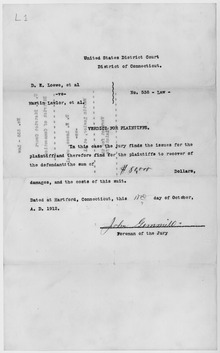Loewe v. Lawlor
[1] The Court's decision effectively outlawed the secondary boycott as a violation of the Sherman Antitrust Act, despite union arguments that their actions affected only intrastate commerce.
Loewe's declaration sparked a strike and a boycott by the United Hatters of North America (UHU), which had organized 70 out of 82 firms in the hat manufacturing industry.
[5] The nationwide boycott was assisted by the American Federation of Labor (AFL) and was successful in persuading retailers, wholesalers and customers not to buy from or do business with Loewe.
[7] The case was handled in the first instance by the United States Circuit Court for the District of Connecticut, which dismissed the suit on the grounds that the alleged actions fell outside the scope of the Sherman Act.
And that conclusion rests on many judgments of this court, to the effect that the act prohibits any combination whatever to secure action which essentially obstructs the free flow of commerce between the States, or restricts, in that regard, the liberty of a trader to engage in business.The fact that the union was not itself engaged in interstate commerce was irrelevant since the act did not distinguish between the types of associations involved but simply forbade every contract, combination, or conspiracy in restraint of trade.
The provisions, however, were narrowly interpreted by the Supreme Court, which ruled, in Duplex Printing Press Company v. Deering (1921), that the exemptions in the Clayton Act did not protect secondary boycotts from judicial control.
